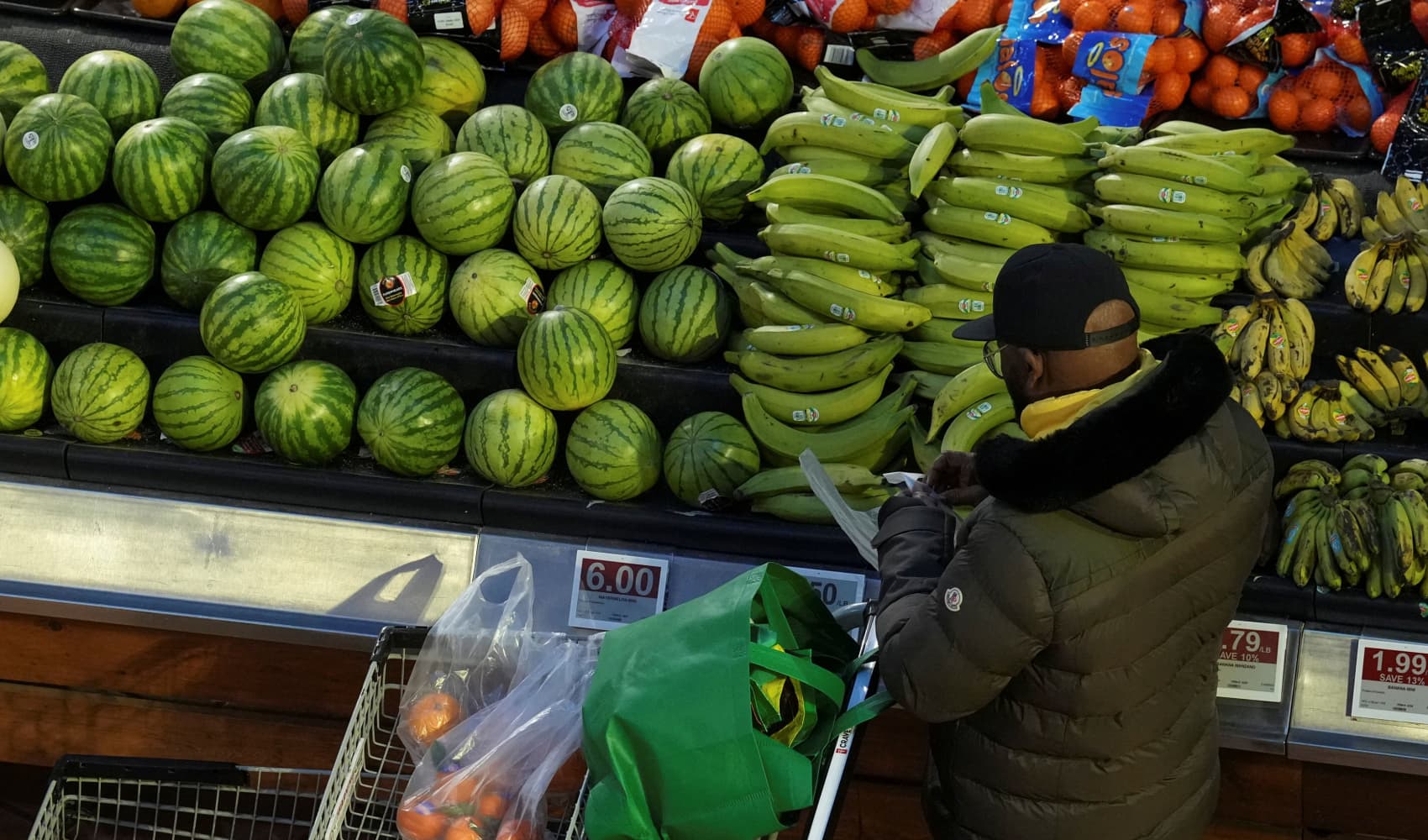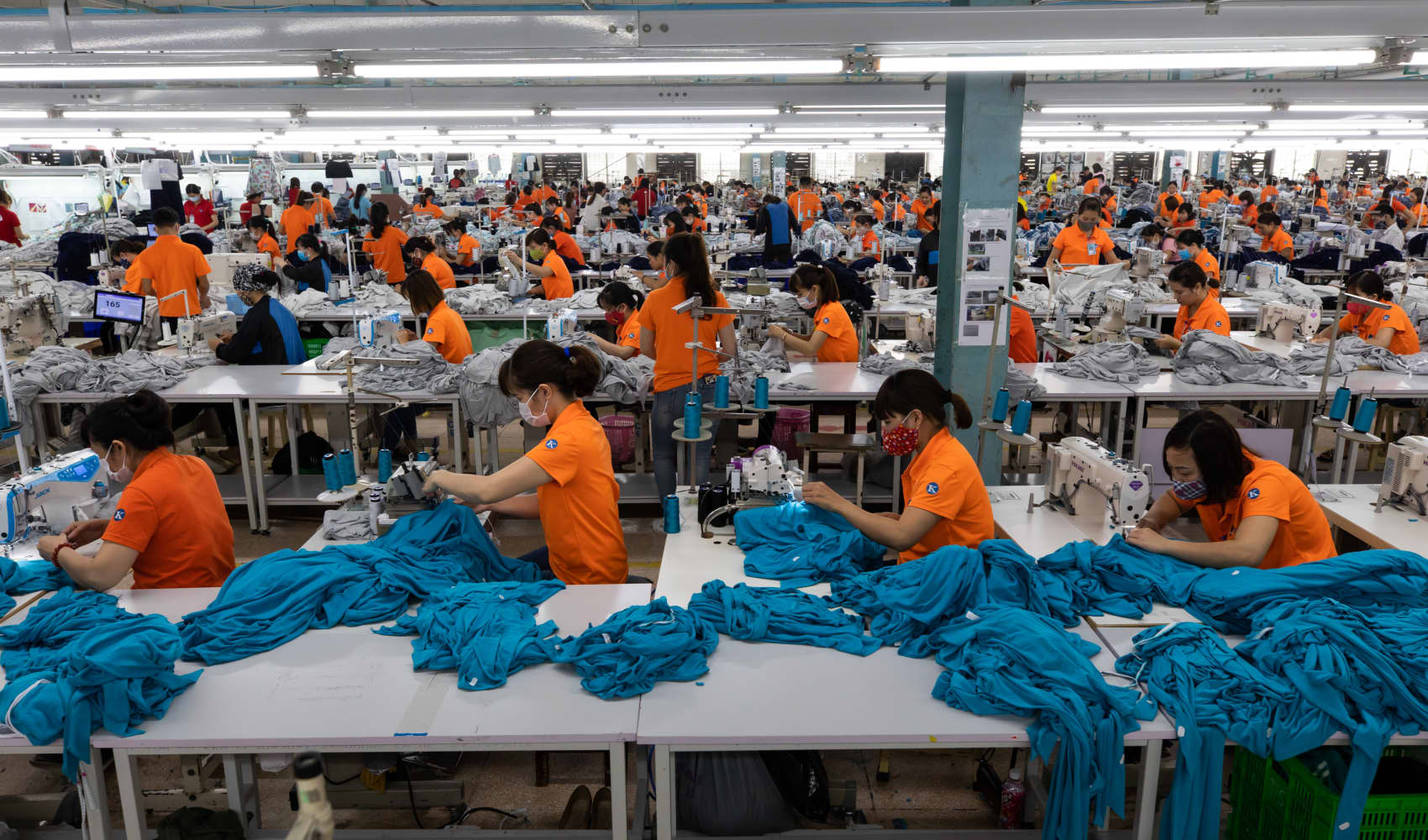
Russia’s President Vladimir Putin speaks on the phone during a conversation with Agatha Bylkova from the Kurgan region, an 8-year-old participant of a New Year’s and Christmas charity event, in Moscow, Russia, January 3, 2023.
This was CNBC's live blog tracking developments on the war in Ukraine. See here for the latest updates.
North Korea and Russia look to be forging deeper military and political ties as Moscow's appetite for weaponry grows amid the ongoing war in Ukraine.
A White House official said Monday that North Korean leader Kim Jong Un plans to travel to Russia to meet with Russian President Vladimir Putin this month and that arms negotiations between the countries "are actively advancing."
Watch NBC 4 free wherever you are
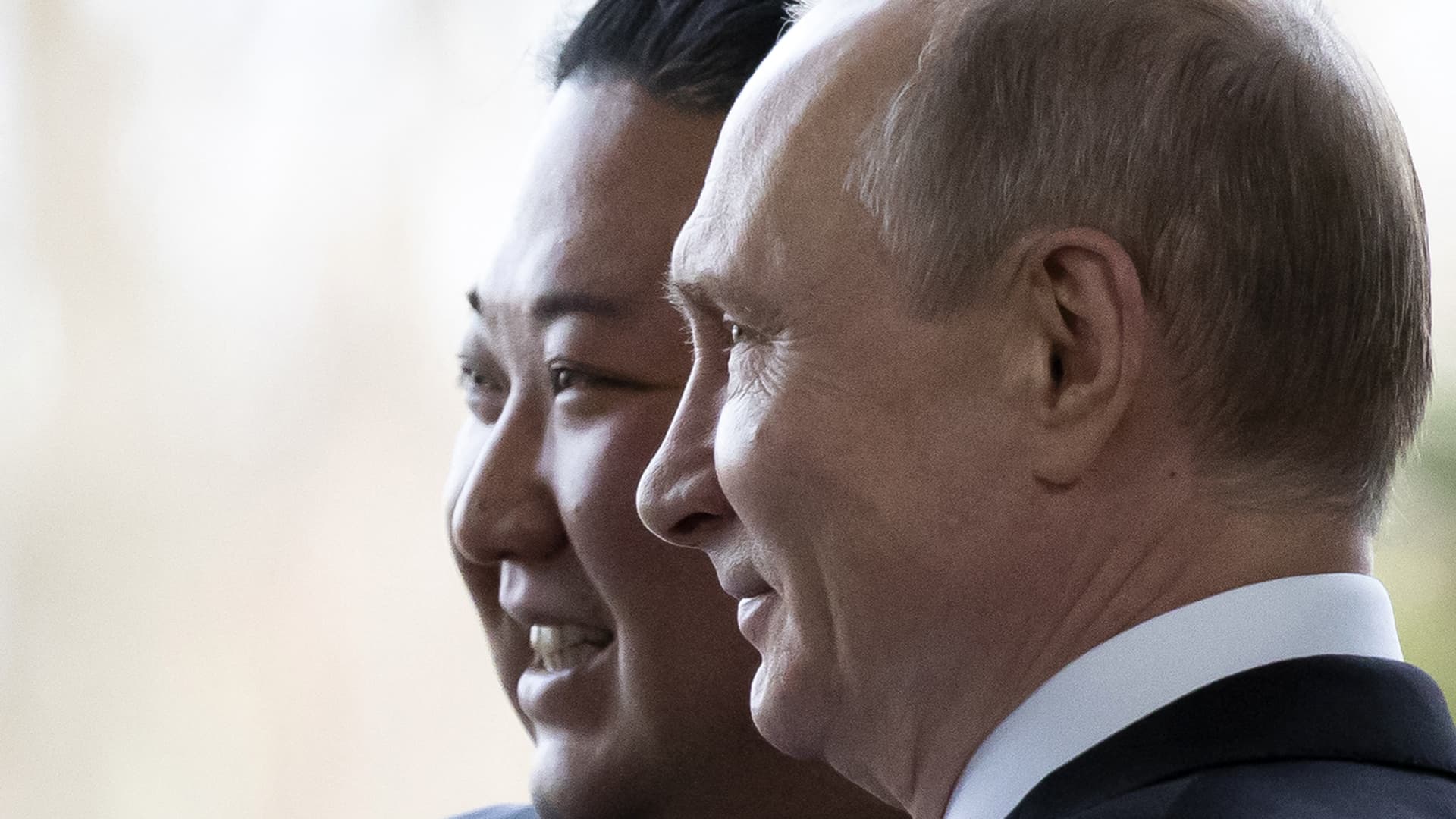
The New York Times also reported Monday that Kim Yong Un would likely travel from Pyongyang to Russia's Pacific Coast city of Vladivostok in an armored train, citing unnamed U.S. and allied sources.
Get Tri-state area news delivered to your inbox with NBC New York's News Headlines newsletter.
Meanwhile, talks between Putin and his Turkish counterpart aimed at reviving a grain export deal with Ukraine ended in failure Monday, with Putin saying the agreement wouldn't be revived unless obstacles to Russian exports were removed.
"I would like to reaffirm our principled position: we will be ready to consider the possibility of reviving the 'grain deal' ... and we will do this immediately — as soon as all the agreements on lifting restrictions recorded in it are fully implemented for the export of Russian agricultural products," Putin said following the talks in Sochi.
Money Report
Cuba uncovers human trafficking ring, coercing citizens to fight in war
Cuban officials have detected, and are now working to dismantle, a human trafficking network within Russia attempting to get Cuban citizens to participate in military operations in Ukraine, Cuba's ministry of foreign affairs said in a press release.
Cuban citizens living in Cuba were also targeted, the ministry said, and criminal proceedings have started against people who were involved.
"Cuba is not part of the war in Ukraine. It is acting and it will firmly act against those who within the national territory participate in any form of human trafficking for mercenarism or recruitment purposes so that Cuban citizens may raise weapons against any country," the ministry wrote in the statement.
The Russian ministry of foreign affairs did not immediately respond to CNBC's request for comment.
— Hannah Ward-Glenton
Return of American nuclear weapons to the UK will be seen as 'escalatory step,' Russian official says
The return of American nuclear weapons to the U.K. will be perceived by Moscow as an "escalatory step," according to Russian Foreign Ministry spokesperson Maria Zakharova, as compiled and translated by NBC News.
There is increasing evidence to suggest that the U.S. may be looking to house American nuclear weapons in the U.K., according to the Federation of American Scientists, who listed a location around 100 kilometers away from the capital, London, as the planned dormitory.
Atomic bombs had been stored at the Lakenheath Royal Air Force base from 1954, before they were removed in 2008, according to the Federation.
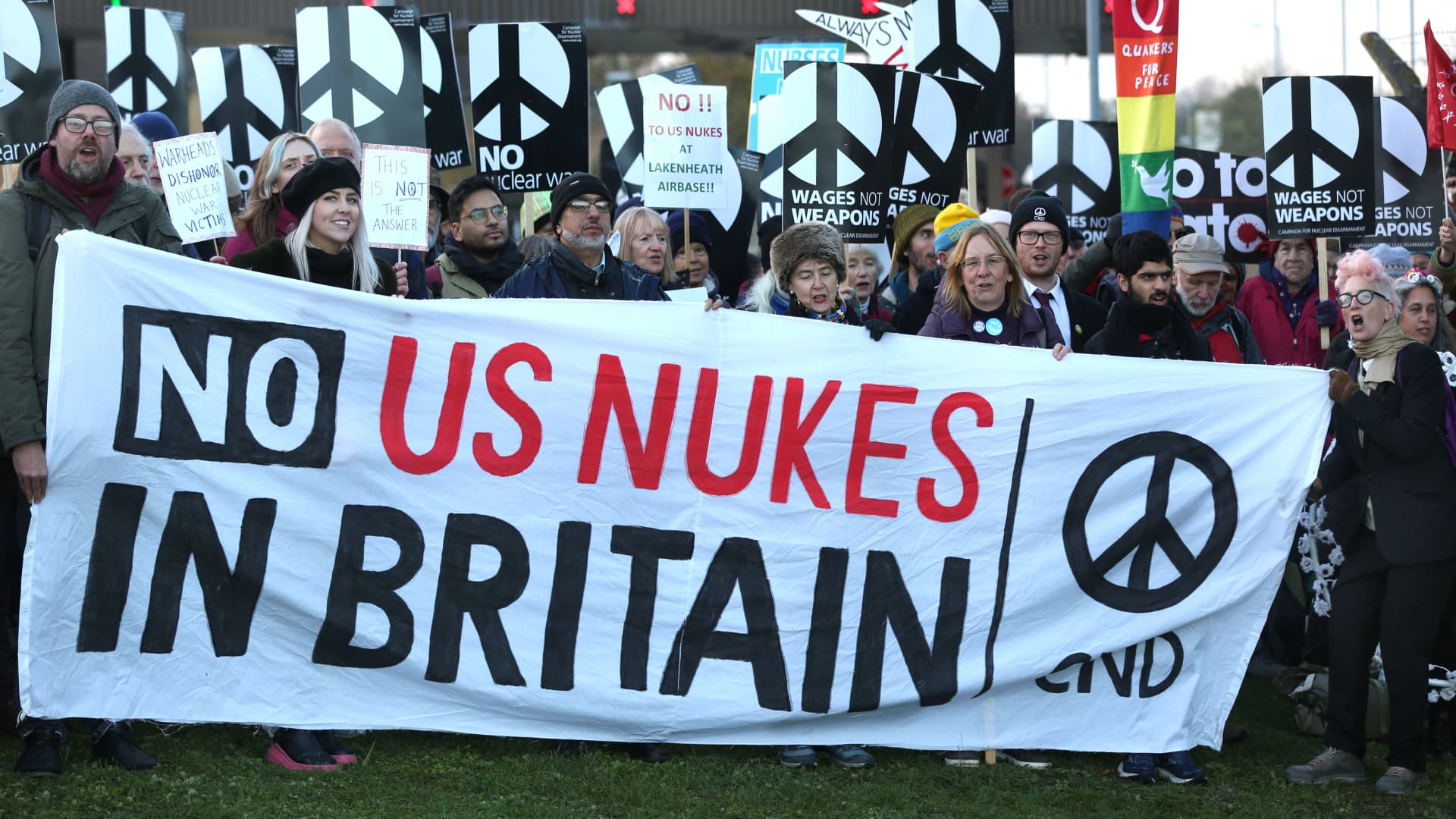
Zakharova described the move as "leading exactly in the opposite direction from the solution of the urgent task of withdrawing all US nuclear weapons from European countries, where they are deployed in the framework of the so-called NATO joint nuclear missions."
Moscow also regards the West's plans to expand weapons production in Ukraine as further confirmation of its involvement in the war between Russian and Ukraine. Zakharova said the Kremlin "paid attention" to announcements by the likes of Rheinmetall and subsidiaries of BAE Systems to assist in maintaining equipment for Ukraine's armed forces.
"We consider such intentions as another confirmation of the Western ruling circles and military-industrial complex's direct involvement in the conflict and support for the criminal Kiev regime," she added.
— Hannah Ward-Glenton
Top Russian general resurfaces after Prigozhin mutiny, media reports
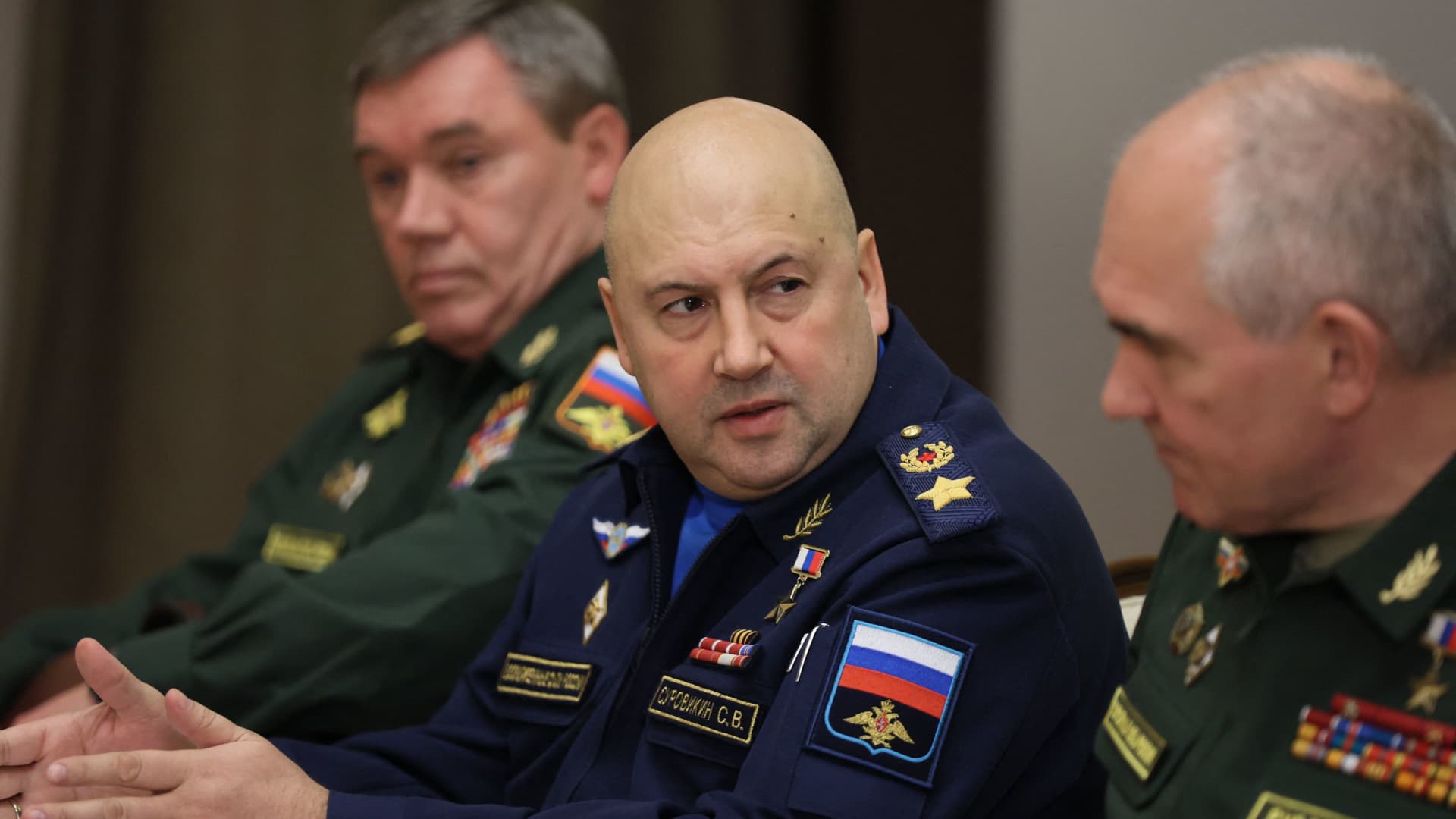
A photo has emerged online that appears to show Russian General Sergei Surovikin, a top military figure who was regarded as an ally of Yevgeny Prigozhin, alive and in public.
Surovikin had not been since since Prigozhin's failed mutiny in June, prompting speculation that he had been detained for his links to the ill-fated mercenary boss. Prigozhin, the head of the mercenary Wagner Group, died last month in a plane crash.
The general's last public appearance was on the day of the rebellion itself as he called on Prigozhin to turn back as he and a band of Wagner mercenaries headed to Moscow. The rebellion was seen as the culmination of a long-running dispute between Prigozhin and Russia's defense ministry.
On Monday, however, a photo was posted on Telegram by Russian media personality Ksenia Sobchak purportedly of Surovikin and his wife. NBC News was unable to authenticate the image.
"General Sergei Surovikin is out. Alive, healthy, at home, with his family, in Moscow. Photo taken today," Sobchak wrote in a caption on the picture on Telegram.
The general was reportedly arrested in June and then dismissed as the head of Russia's Aerospace Forces in August, according to the Moscow Times.
Meanwhile, the New York Times reported that Surovikin appeared to have been freed but cited unnamed U.S. officials as saying it was not clear if his movement was restricted.
The Kremlin and Russian defense ministry have refused to answer reporters' questions on the whereabouts and role of Surovikin now.
Surovikin had been appointed to lead Russia's armed forces in Ukraine last October, and was credited for spearheading the building of deep lines of Russian defenses on occupied territory ahead of Ukraine's counteroffensive. The defensive lines have proved a hard obstacle for Ukraine to overcome.
Surovikin was replaced by Putin loyalist General Valery Gerasimov in January 2023, with speculation that he was replaced because he had become too powerful.
— Holly Ellyatt
Russian oil and gas budget revenues down by a fifth in August
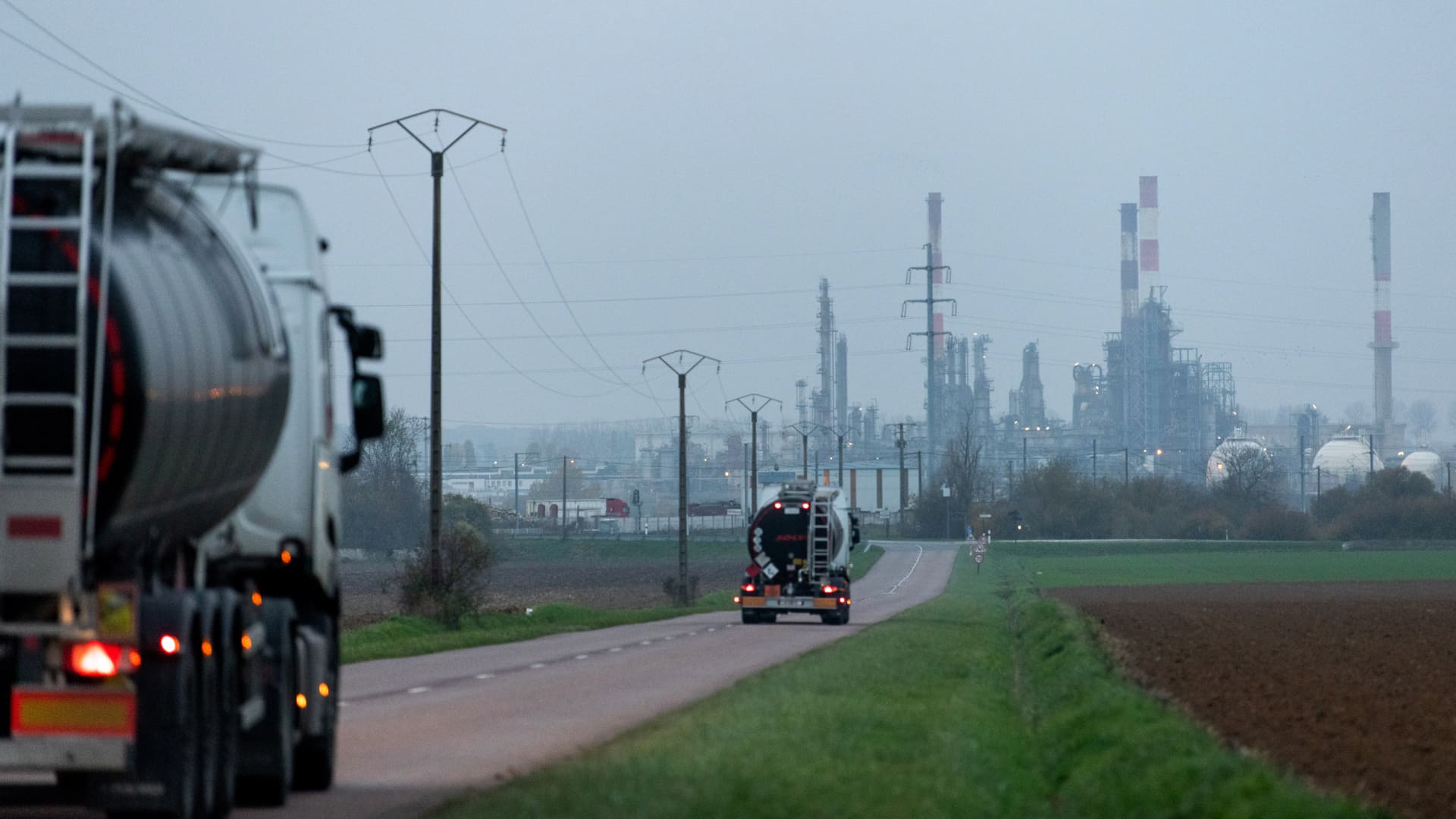
Russia's oil and gas revenues in August were almost 21% lower than in July at 642.7 billion roubles ($6.6 billion), finance ministry data showed on Tuesday, amid rising subsidies to oil refineries and a cyclical fall in profit-based tax.
Revenues were also down 4.3% compared to the same month in 2022. In July this year, oil and gas revenues stood at 811.3 billion roubles. Proceeds from oil and gas sales are crucial for Russia's commodity-oriented economy.
In January-August, oil and gas revenues fell by 38.1%, year-on-year, to 4.836 trillion roubles, as tax returns declined due to lower prices and sales volumes.
Russia's energy revenues have been squeezed by Western sanctions, such as price caps and an embargo on sea-borne oil exports, and by the closure of the
Nord Stream gas pipelines to Europe that were blown up in September 2022. Investigators have yet to establish who was responsible for the blasts.
Proceeds in August declined mainly due to a steep fall in profit-based tax, which is paid once a quarter. Payments to refineries under the so-called "damping mechanism" - introduced to stop companies from capitalising on high fuel export prices in order to defend the domestic market - also rose to 185.9 billion roubles last month from 110.4 billion roubles in July.
The finance ministry budgeted for a fall in oil and gas revenues by 23% this year to 8.94 trillion roubles. It expects a budget deficit of almost 3 trillion roubles, or 2% of gross domestic product (GDP).
Russia's budget deficit for January-July widened to 2.82 trillion roubles ($29.3 billion), or 1.8% of GDP. Finance Minister Anton Siluanov had repeatedly said that Russia will stick to its target for a 2023 deficit of no more than 2% of GDP. But in July he acknowledged that 2.5% of GDP was possible.
— Reuters
Russian defense minister claims Ukraine's counteroffensive has been unsuccessful
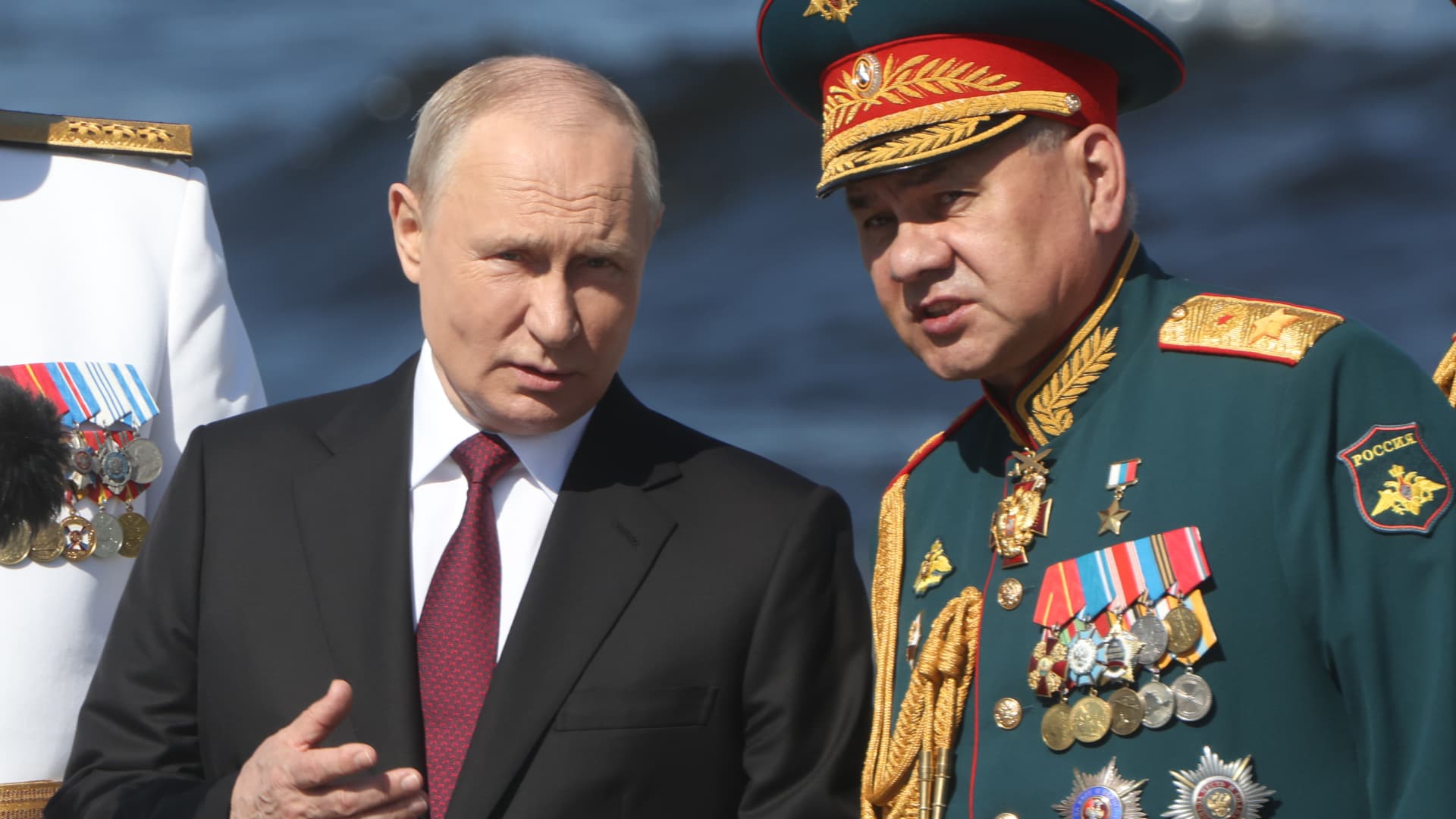
Russia's Defense Minister Sergei Shoigu claimed Tuesday that Ukraine's counteroffensive had been unsuccessful, but acknowledged the situation was tense in the southern Ukrainian region of Zaporizhzhia, where Ukraine's forces claimed to have broken through a first layer of Russian defenses.
"The Kiev [Russia uses this spelling for the Ukrainian capital] regime, despite colossal losses, has been trying to conduct a so-called counter-offensive for three months now. The Ukrainian armed forces did not achieve their goals in any of the directions," Shoigu said during a conference call to Russian defense officials, a statement released by the Ministry of Defense said.
Shoigu added that the Ukrainian leadership was "desperately trying to demonstrate to Western curators at least some success of offensive actions in order to further receive military-economic assistance, which only prolongs the conflict."
The minister said the "most tense situation" had developed in the Zaporizhzhia area, saying Ukraine had "brought into battle brigades from the strategic reserve, whose personnel were trained under the guidance of Western instructors."
Last weekend, Ukrainian officials said their units had broken through the first (and toughest) line of Russian defenses in the Zaporizhzhia area as they aim to push southwards toward Melitopol and Berdiansk and cut Russia's so-called "land bridge" to occupied Crimea.
Ukraine has seen few territorial gains since launching its counteroffensive in June. Deep lines of Russian defenses, built in the winter and spring in the lead up to the counteroffensive, have proven tricky to surmount. It's hoped in Kyiv that momentum will build following the recent breakthrough in the south.
— Holly Ellyatt
Kremlin refuses to comment on reported Russia-North Korea talks
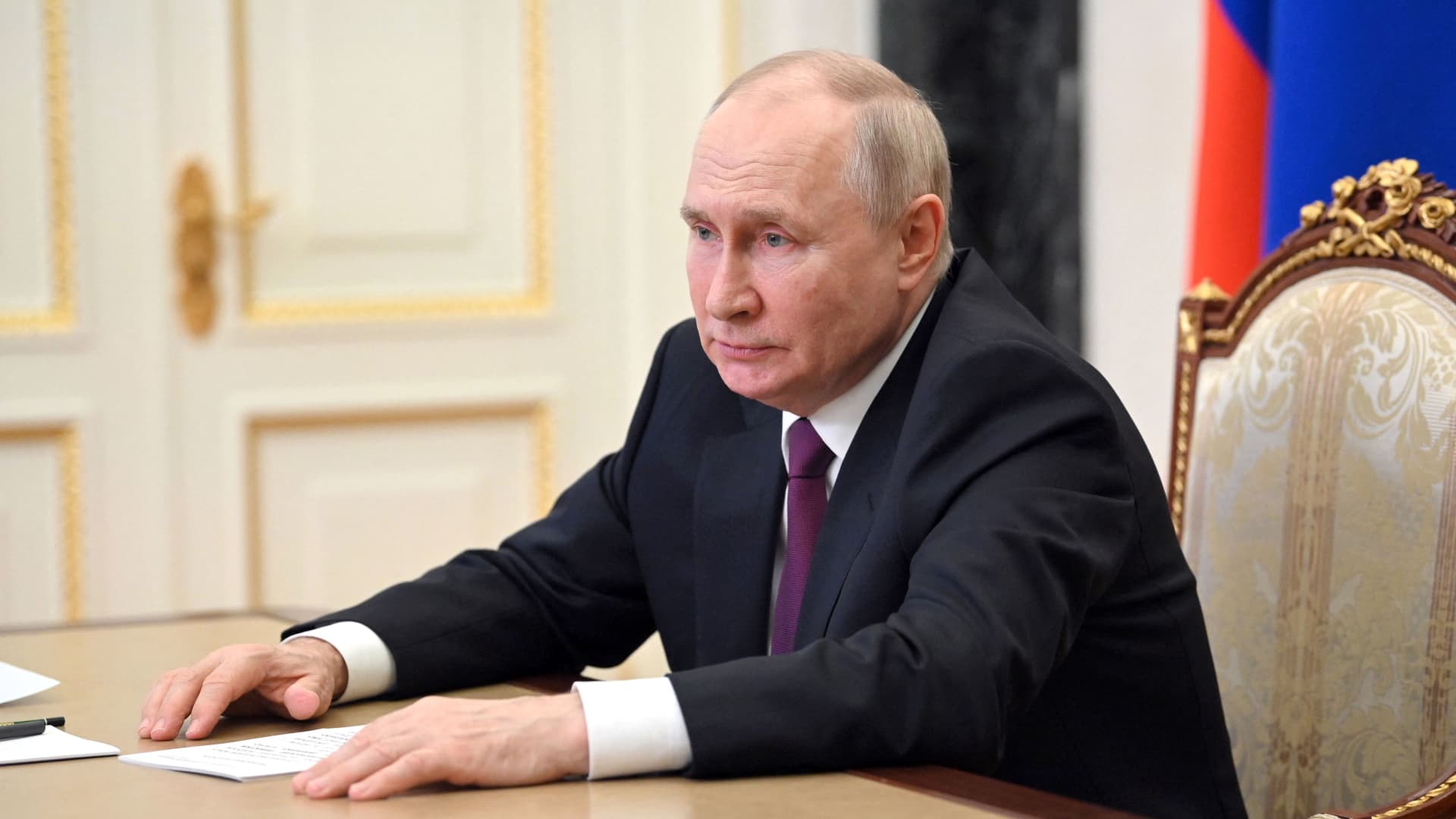
The Kremlin has refused to comment on reports that North Korea's leader Kim Jong Un could be planning to travel to Russia to meet President Vladimir Putin for talks later this month.
When asked by reporters to comment on media reports, and comments by the White House, suggesting a meeting could take place next week, the Kremlin's press secretary declined to comment saying, "we have nothing to say on this topic."
A White House official said Monday that Kim Jong Un plans to travel to Russia to meet with Putin this month and that arms negotiations between the countries "are actively advancing."
U.S. National Security Council spokeswoman Adrienne Watson added, in a statement reported Monday, that the White House had "information that Kim Jong Un expects these discussions to continue, to include leader-level diplomatic engagement in Russia."
The New York Times also reported Monday that Kim Yong Un would likely travel from Pyongyang to Russia's Pacific Coast city of Vladivostok in an armored train, citing unnamed U.S. and allied sources.
— Holly Ellyatt
Russia says it destroyed Ukrainian drones heading towards Moscow, Crimea
Russia said its air defense forces destroyed drones, or unmanned aerial vehicles, flying towards Moscow.
The capital's Mayor Sergey Sobyanin said on Telegram that "the Air Defense Forces early on Tuesday downed attack drones that were targeted at Moscow. They were destroyed in the air over the Kaluga region and the Istra district in the Moscow region."
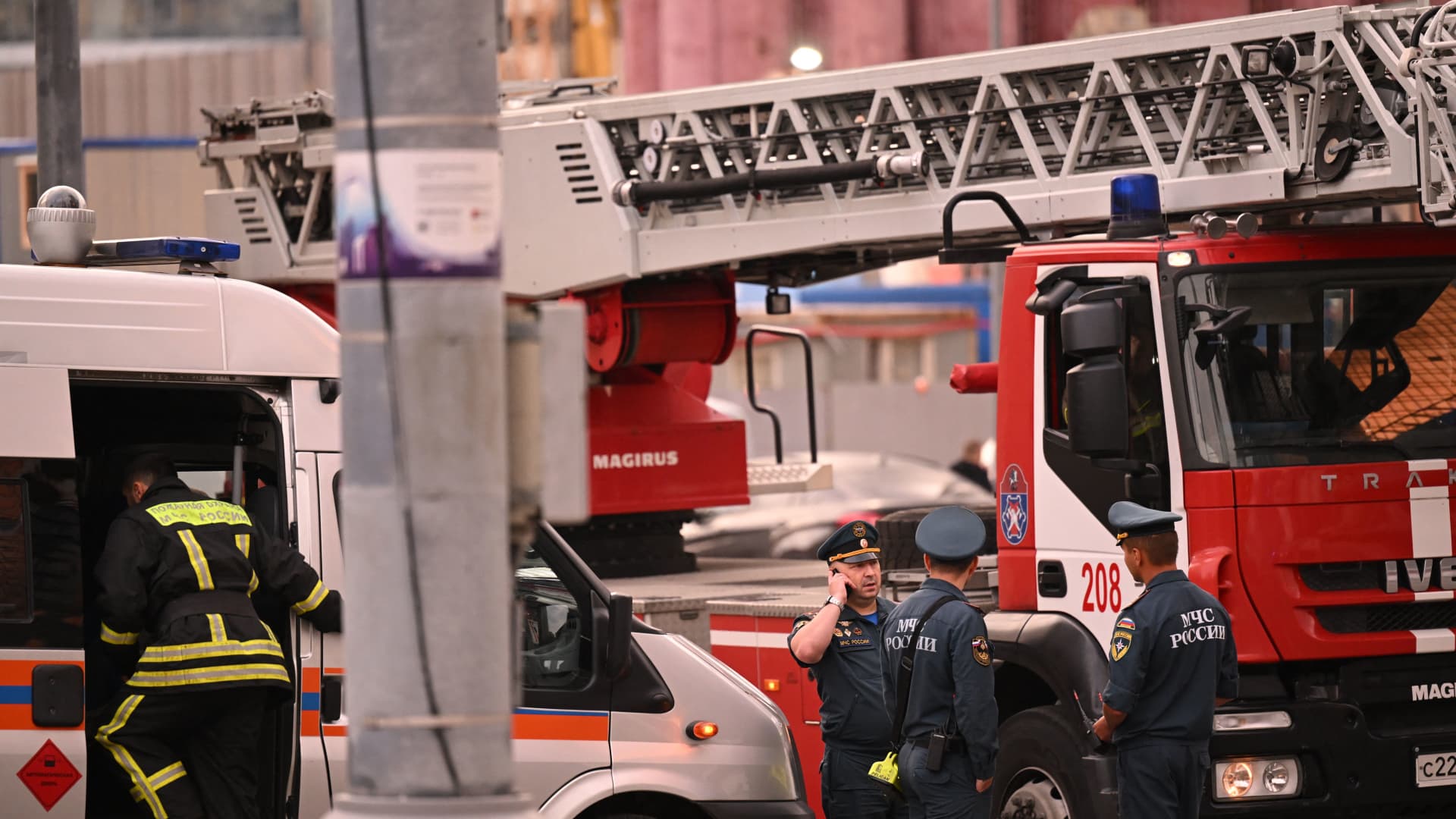
Sobyanin added that a household was damaged after debris from a downed drone landed in the Istra area to the west of Moscow. Another drone was then destroyed over the Tver area northwest of Moscow.
Russia's Ministry of Defence also cited the alleged attempted drone attacks in the Moscow area on Telegram. It said earlier that an alleged Ukrainian drone had also been destroyed by air defenses over the Russian-occupied peninsula of Crimea.
CNBC was unable to immediately verify the claims.
Read more
‘The war is coming home to Russia’: Ukraine turns the tables on Moscow as drone warfare intensifies
Ukraine appears to have increased the intensity of drone assaults against Russian territory this year with a number of attacks, against at least six Russian regions, taking place last week.
— Holly Ellyatt
North Korean leader could travel to meet Putin this month, reports suggest
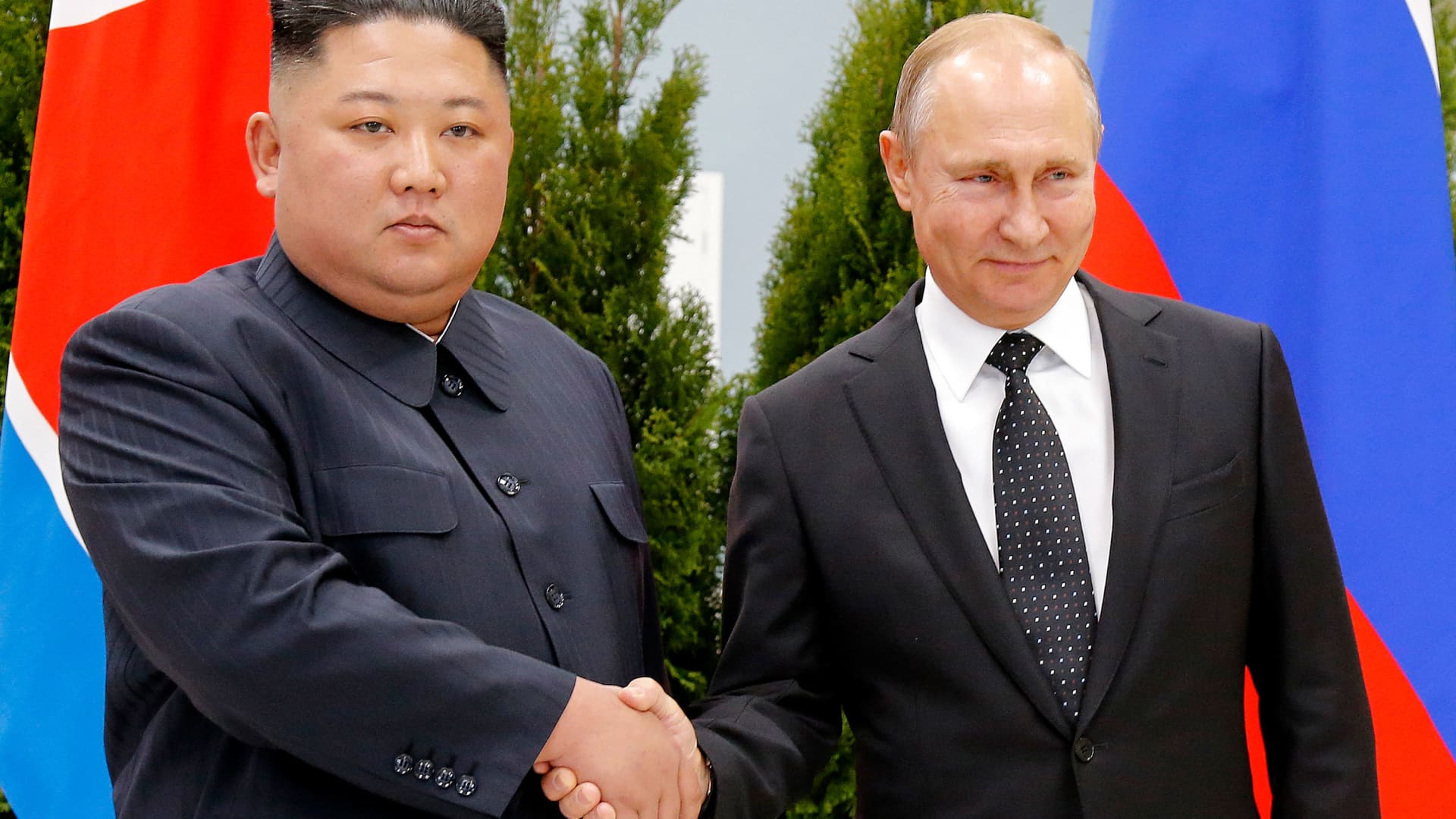
North Korea and Russia look to be forging deeper military and political ties as Moscow's appetite for weaponry grows amid the ongoing war in Ukraine.
A White House official said Monday that North Korean leader Kim Jong Un plans to travel to Russia to meet with Russian President Vladimir Putin this month and that arms negotiations between the countries "are actively advancing."
U.S. National Security Council spokeswoman Adrienne Watson added, in a statement reported Monday, that the White House had "information that Kim Jong Un expects these discussions to continue, to include leader-level diplomatic engagement in Russia."
The New York Times also reported Monday that Kim Yong Un would likely travel from Pyongyang to Russia's Pacific Coast city of Vladivostok in an armored train, citing unnamed U.S. and allied sources.
The talks, which could take place on the sidelines of the Eastern Economic Forum, which is scheduled to run from Sept. 10 to 13, would include the possibility of supplying weapons for the war in Ukraine, the newspaper said. CNBC has contacted the Kremlin for further comment and is awaiting a response.
There has been long-standing concern over Russia and North Korea's deepening ties in the military sphere.
Russian Defense Minister Sergei Shoigu recently visited Pyongyang for discussions on potential arms deals, the U.S. said last week, and Putin and Kim Jong Un have exchanged letters pledging to increase their cooperation.
On Monday, Shoigu said the possibility of conducting joint exercises with the DPRK, the Democratic People's Republic of Korea, is being discussed, news agency TASS reported.
For its part, Pyongyang has said publicly that it does not intend to supply weapons to Russia, although the White House's National Security Council spokesperson John Kirby noted in a briefing last week that North Korea had delivered infantry rockets and missiles into Russia that were used by the Wagner Group private military company.
Kirby warned that the U.S. would impose sanctions on any participants in an arms deal.
"We urge the DPRK to cease its arms negotiations with Russia and abide by the public commitments that Pyongyang has made to not provide or sell arms production," Kirby said, adding:
"And of course, we'll take action directly by exposing and sanctioning individuals and entities working to facilitate arms deals between these two countries."
— Holly Ellyatt
Putin blames the West for grain deal collapse
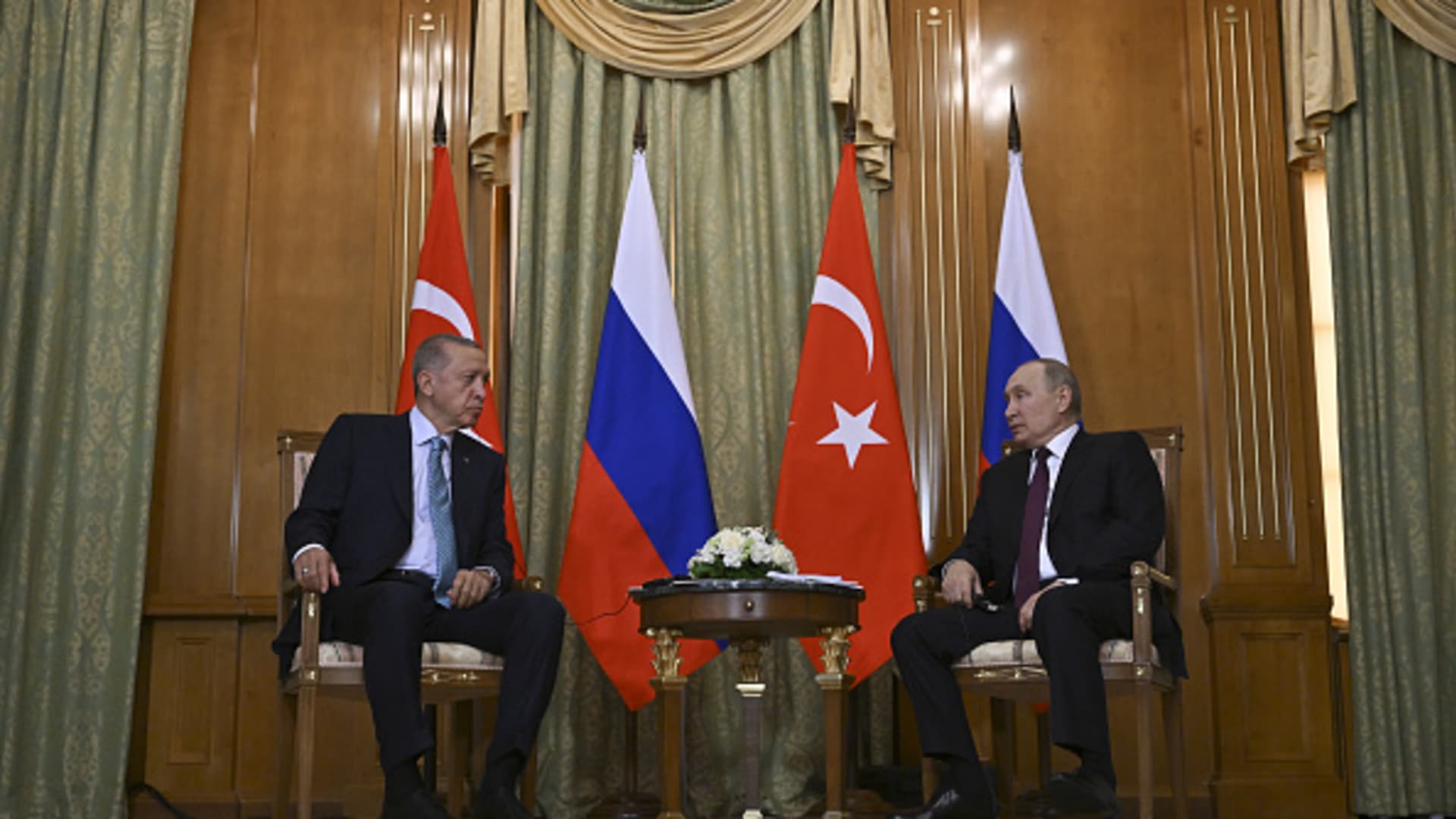
Talks between the Russian and Turkish presidents aimed at reviving a grain export deal with Ukraine ended in failure Monday, with President Vladimir Putin saying the agreement wouldn't be revived unless obstacles to Russian exports were removed.
"I would like to reaffirm our principled position: we will be ready to consider the possibility of reviving the 'grain deal' ... and we will do this immediately — as soon as all the agreements on lifting restrictions recorded in it are fully implemented for the export of Russian agricultural products," Putin said following the talks in Sochi, the Kremlin's website noted.
The Black Sea Grain Initiative was brokered by the U.N. and Turkey and enabled millions of tons to be exported from several Ukrainian ports against a backdrop of war. Russia abandoned the deal in July, however, having complained that its own agricultural exports faced restrictions due to Western sanctions.
In a press conference following talks with Turkey's President Recep Tayyip Erdogan yesterday, Putin blamed the West for the deal's collapse, saying Russia had been "forced" to leave the deal as it still faced export restrictions on its own exports.
He also claimed Moscow had been "deceived" regarding "the humanitarian goals" of the deal:
"The West, to put it mildly, deceived us about the humanitarian goals of the "Black Sea Initiative" to provide assistance to developing countries," he said, claiming instead that the majority of grain exports from Ukraine had gone to wealthy countries mainly in the EU.
At the talks, Russia agreed that it would supply 1 million tons of discounted grain to Turkey for onward export to African countries most in need, with the assistance of Qatar.
— Holly Ellyatt
German lawmaker claims Scholz is blocking Taurus missiles for Ukraine
German Chancellor Olaf Scholz is blocking the delivery of long-range Taurus missiles to Ukraine, according to a prominent German lawmaker.
Ukraine has been requesting the Swedish/German-made cruise missiles that have a range of up to 500 kilometers, or 311 miles, for months. However, no decision has been made in Berlin about whether to authorize their supply to Kyiv.
On Monday, the head of the Bundestag Defense Committee and German Free Democratic Party (a member of the governing coalition) Marie-Agnes Strack-Zimmermann blamed Scholz for the delay.
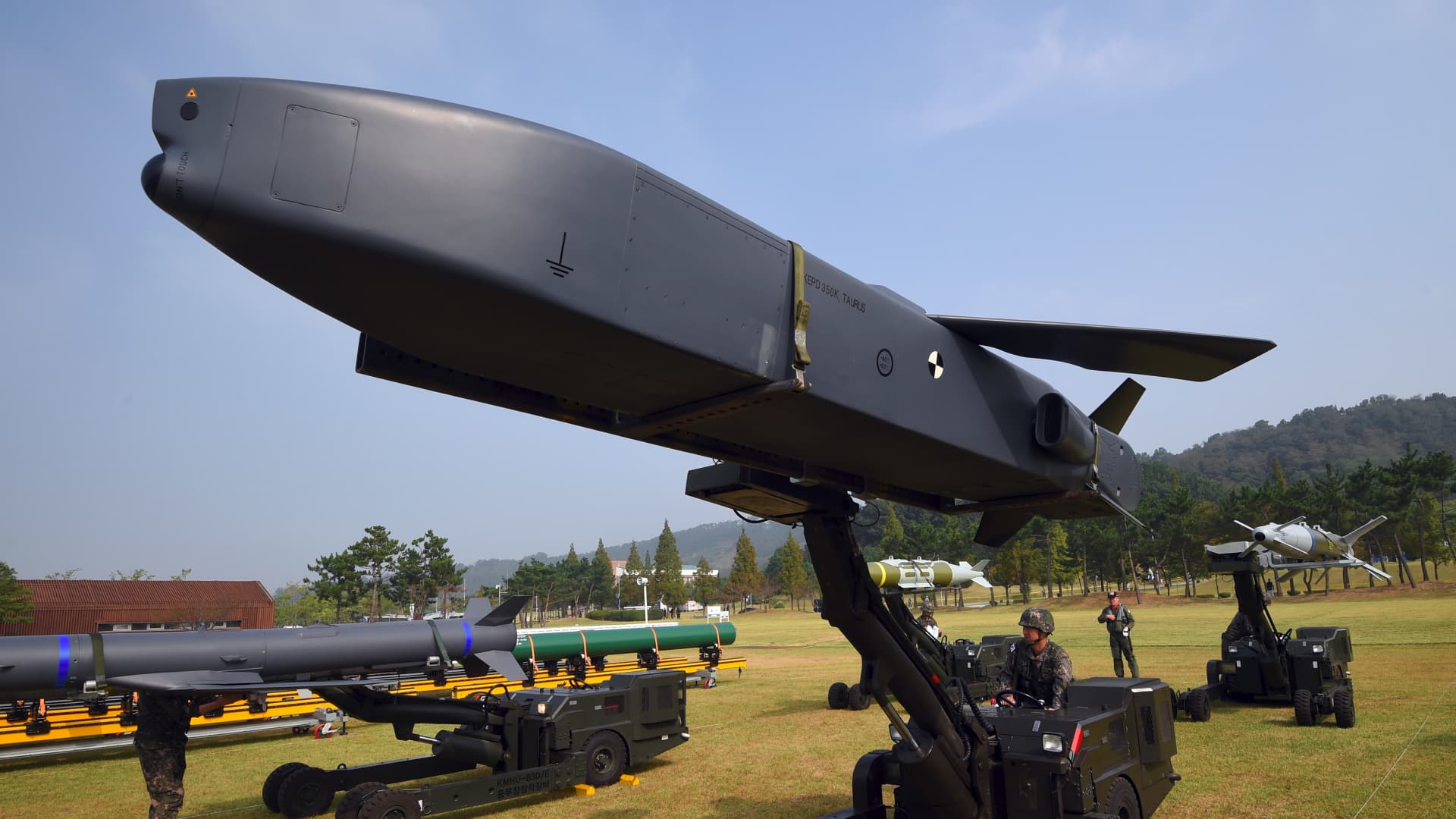
Writing on X, previously known as Twitter, she said Scholz is blocking this decision within the coalition.
"What is the @Bundeskanzler [German Chancellor] waiting for in God's name? He alone blocks this decision within the coalition. That's irresponsible," she wrote, without presenting evidence for her claim.
Ukrainian presidential adviser Mykhailo Podolyak is among the Ukrainian officials urging Kyiv's allies to provide it with more long-range missiles. He has criticized slow-decision making among allies, telling the Bild newspaper that Berlin needed to make "decisions faster and more decisively."
Ukraine has sought to reassure its partners that such missiles would not be used to strike Russian territory itself but Russian resources being used against it in the war. Germany was criticized previously for its slow decision-making on giving Ukraine Leopard tanks.
CNBC has requested a comment from the German Chancellery and is awaiting a response.
— Holly Ellyatt
Putin and Erdogan meet in Sochi for grain deal talks

Russian President Vladimir Putin is meeting his Turkish counterpart in Sochi Monday with a potential new grain export deal on the agenda.
Ahead of the talks, Putin said Russia's relations with Turkey were strong and set to diversify, adding that he hoped there would be progress on creating a gas hub in Turkey.
Putin added that security issues would be high on today's agenda, such as ongoing unrest in Syria, as well as the grain deal.
Turkey's President Recep Tayyip Erdogan said the grain deal is the focus of talks, adding that Turkey was optimistic a new grain deal could be reached: "I hope we will be able to send a message to the world and Africa today," he said, according to comments reported by NBC.
— Holly Ellyatt
Ukraine limits cargo shipments to Danube port after Russian strikes
Ukrainian railways have partially restricted cargo shipments to Ukraine's major Danube River port Izmail, which has been the target of Russian drone attacks in recent weeks, the railways said on Monday.
The restrictions began on Sunday, the railways said in a statement. Russia has attacked Ukrainian ports on the Danube River with drones two nights in a row.
The latest attack on the Danube River port of Izmail, in Ukraine's southern Odesa region, hit warehouses and production buildings, and debris from drones that were shot down set ablaze several civilian infrastructure buildings, the regional authorities said.
Ukraine said some Russian drones detonated on the opposite bank in Romanian territory. Romania denied this.
The Danube has become Ukraine's main route for exporting grain since July, when Russia quit a U.N.- and Turkey-brokered deal that had given safe passage to Kyiv's exports of grains, oilseeds and vegetables oils via the Black Sea.
— Reuters
Read CNBC's previous live coverage here:
Ukraine dismisses defense minister just as southern forces break through Russian defensive line


